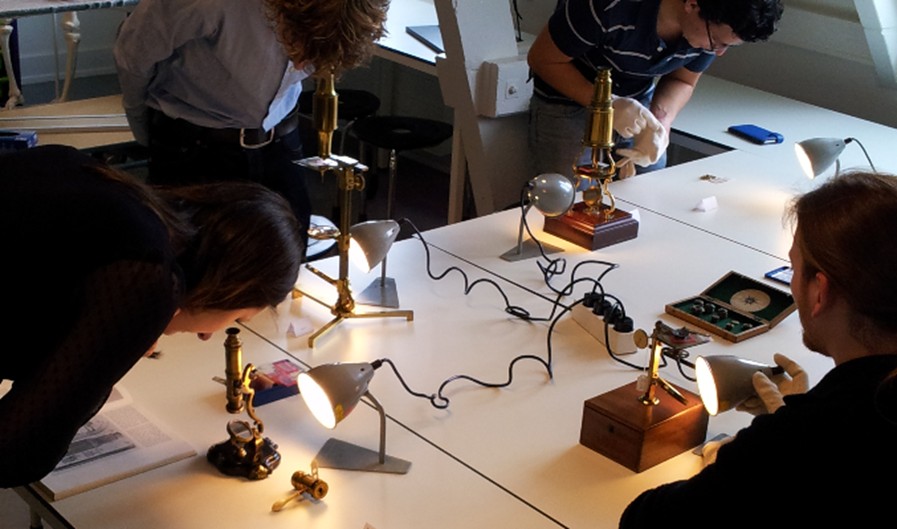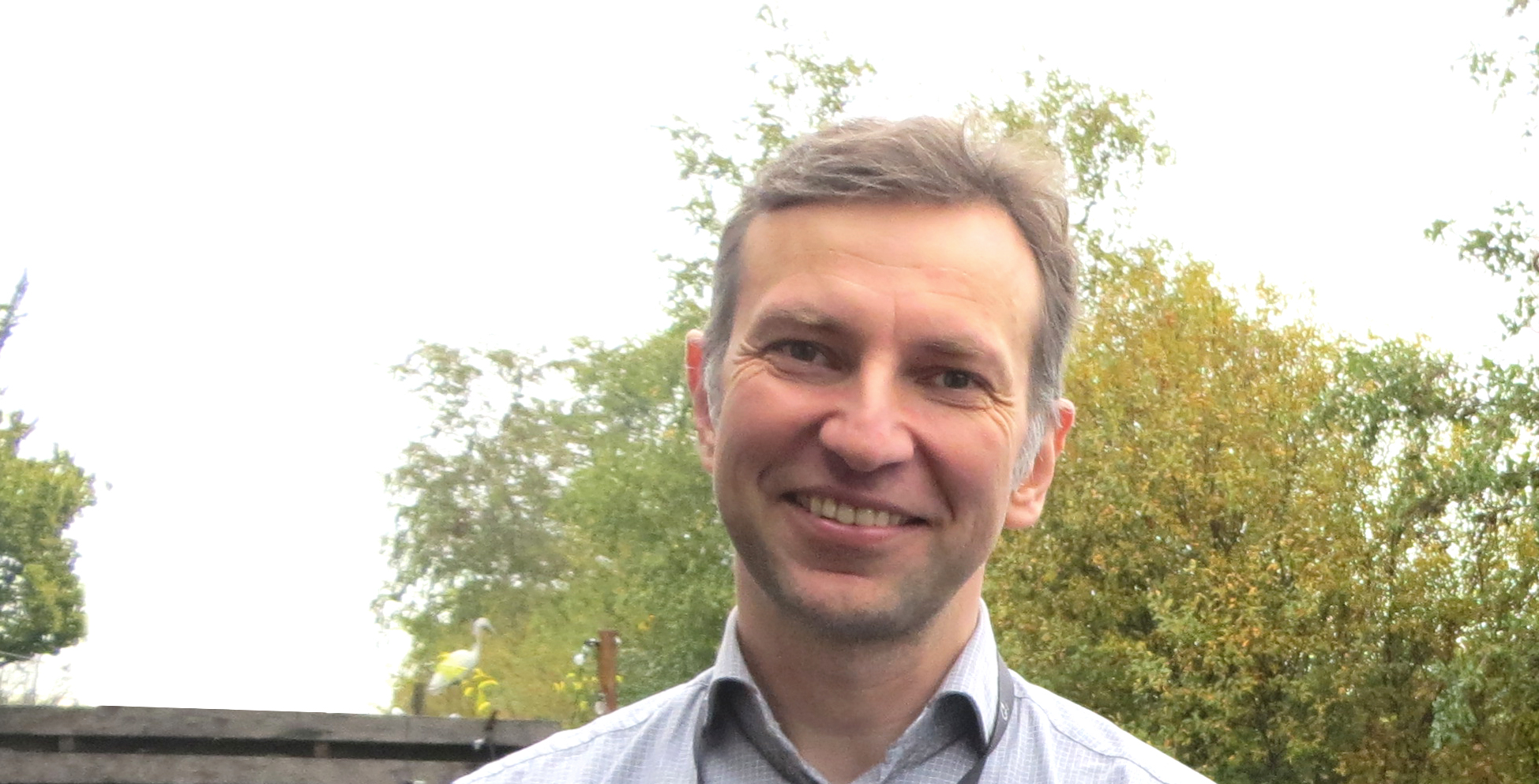Courses
Faculty members from Cell Biology group take part in master classes and courses from the Master Programme Molecular and Cellular Life Sciences:
Master course LIGHT MICROSCOPY (B-MLMIC)
Coordinator:
dr. Lukas Kapitein
tel. 030-253 3458
e-mail: l.kapitein@uu.nl
For most recent information: see https://cursusplanner.uu.nl/course/B-MLMIC
Lecturers:
- Lukas Kapitein, Cell Biology, Faculty of Science, Utrecht University (l.kapitein@uu.nl)
- Saskia Ellenbroek, Van Rheenen Group, Hubrecht Institute, Utrecht (s.ellenbroek@hubrecht.eu)
- Anna Akhmanova, Cell Biology, Faculty of Science, Utrecht University (a.akhmanova@uu.nl)
- Gerhard Blab, Biophysics, Faculty of Science, Utrecht University (g.a.blab@uu.nl)
- Ihor Smal, Biomedical Imaging Group, Erasmus MC, Rotterdam (i.smal@erasmusmc.nl)
- Max Adrian, Cell Biology, Faculty of Science, Utrecht University (m.adrian@uu.nl)

Microtubules near the centrosome imaged using dSTORM superresolution microscopy
Content
You will acquire basic and advanced knowledge on optical microscopy, with an emphasis on fluorescence microscopy. Four two-hour technology lectures will guide you through the field of optical microscopy, covering a large array of topics ranging from fundamental principles of image formation and fluorescence to modern techniques such as superresolution microscopy (see detailed program). Three one-hour applications lectures from different scientists will demonstrate how these techniques can be employed to solve important biological problems. In addition, four afternoons will be devoted to hands-on practical work, during which students can directly see modern microscopy at work at state-of-the-art facilities (featuring spinning-disk confocal microscopy, TIRFM, single-molecule fluorescence, photo-ablation, superresolution microscopy). This part will be complemented by training in reading and interpretation of scientific literature, illustrating employment of microscopic imaging techniques.

Historical Microscopy at the University Museum
The goals of this Master course are:
At the end of the course, you will know:
- the fundamentals of light microscopy, and fluorescence microscopy in particular
- the basics of advanced, current techniques in fluorescence microscopy as well as their applications
At the end of the course, you are able to:
- understand and evaluate current cell biological literature employing these techniques
- perform live-cell imaging on advanced microscope setups
- perform basic image analysis
- design experimental approaches to biological questions using these techniques
Literature:
Will be sent before the course
Slide handouts will be available
Useful link: http://micro.magnet.fsu.edu/primer/
Contribution to the Molecular and Cellular Life Sciences courses
Introductory course Quantitative Biology: https://cursusplanner.uu.nl/course/B-MQBIO
Journal club QBio honours programme: https://cursusplanner.uu.nl/course/B-MQBJCL
Molecules & Cells: https://cursusplanner.uu.nl/course/SK-MCMC
Concepts in Science 4 Life: https://cursusplanner.uu.nl/course/SK-MCSL
Concepts in Cellular Life Sciences: https://cursusplanner.uu.nl/course/SK-MICLS
Biophysics & Molecular Imaging: https://cursusplanner.uu.nl/course/SK-MCBMI
Biotechnology and the societal challenge: https://cursusplanner.uu.nl/course/B-MSBBSC
Systems Biology: https://cursusplanner.uu.nl/course/SK-MCSB
Fundamentals of Neuroscience and Cognition: https://cursusplanner.uu.nl/course/BMB500103
Contribution to the MSc Diergeneeskunde courses
Neurobiologie van Gedrag: https://osiris.uu.nl/osiris_student_uuprd/OnderwijsCatalogusSelect.do?selectie=cursus&collegejaar=2017&cursus=DKM-NBG
Internships
Master students are welcome to perform internships in the Cell Biology group. We support master students from the Utrecht University Graduate School of Life Sciences (GSLS). from Molecular and Cellular Life Sciences (MCLS) and Cancer Genomics & Developmental Biology (CG&DB) as well as from other research Master programmes are welcome to apply.
Also students from other Dutch Universities are welcome. We can offer possibilities for a minor or major research project (internship), for writing a thesis/research project and help with organizing an internship abroad.
How to organize an internship at the Cell Biology?
If you are interested in performing an internship in the Cell Biology group, please have a look at the research projects performed in the group. This information is presented at our website: cellbio.nl.
Next, contact the PI responsible for the research you are most interested in. Do this by writing an e-mail, in which you explain your background education, your preference for a minor or major research project, and the anticipated starting date. You will receive an invitation from this PI to meet and discuss the research possibilities.
What will you learn?
You will learn how to plan and carry out an experimental research project on molecular and cellular biology or cellular biophysics. All master students working in Cell Biology group will have their own personal supervisor. This can be a postdoc, a PhD student or a technician. Together with your supervisor you will formulate your own research project: you will be responsible for this part of the research, and you will be a member of the research team of your PI. You will learn the required techniques and receive information about the theoretical background of your research. As a team member you will learn how to present your experimental results and you will take part in the work discussions of your team and of the Cell Biology group. At the end of your internship you will write a report (as a scientific paper) and give an oral presentation of your work.





 Anna Akhmanova:
Cellular Dynamics
Anna Akhmanova:
Cellular Dynamics Lukas Kapitein: Biophysics
Lukas Kapitein: Biophysics Florian Berger:
Theoretical Biophysics
Florian Berger:
Theoretical Biophysics Agathe Chaigne:
Cell division dynamics
Agathe Chaigne:
Cell division dynamics Ginny Farías:
Neuronal Organelle Dynamics
Ginny Farías:
Neuronal Organelle Dynamics Martin Harterink:
C. elegans neurobiology
Martin Harterink:
C. elegans neurobiology Casper Hoogenraad: Molecular Neuroscience
Casper Hoogenraad: Molecular Neuroscience Maarten Kole:
Axonal Signalling
Maarten Kole:
Axonal Signalling Sabrina Oliveira:
Molecular Targeted Therapies
Sabrina Oliveira:
Molecular Targeted Therapies Ihor Smal: Image Analysis, Smart Microscopy and AI
Ihor Smal: Image Analysis, Smart Microscopy and AI Frederik Verweij:
Extracellular Vesicle Biology
Frederik Verweij:
Extracellular Vesicle Biology